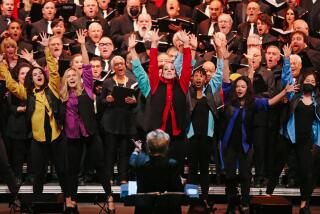Television Review: ‘The Choir’ on BBC America
- Share via
You won’t see anything better on television this summer than “The Choir,” a show about singing that begins Wednesday on BBC America. I usually avoid such superlatives as indemonstrable subjective hyperbole, but I am willing to make an exception here.
Starring choirmaster Gareth Malone now 34, it knits together three British series (originally broadcast in 2006, 2008 and 2009) into a 13-episode whole; in each, Malone builds choral groups where none had been and where nobody had noticed the lack. The first, in a general way, is about getting high school students interested in classical music; the second, set in a sports-oriented boys school, is about getting boys to sing; the third, which takes place in the town-sized working-class housing estate of South Oxhey and involves singers from 8 to 80, is about local pride.
It’s a reality show, as opposed to a strict documentary, in that what happens within it wouldn’t have happened without the concept or the cameras. But it is quite the opposite of American reality TV, which mostly constructs machines to put characters into conflict — either in a flat-out contest or a stressful living situation — where “The Choir” is all about community and support and the sum that is greater than its parts, what you might call the individual team effort.
“I think it’s an excellent model for how people ought to work together,” Malone said recently by phone from England, “because you have to listen to who’s in charge; you have to respect each other and listen to their part and sing in sympathy with them, but you have to hold your own as well. And I think because of that, when you’ve been through the experience of performing with other people, you know them in a really terrific sense. Which is why people join choirs when they’re 20 and sometimes they don’t leave, well, until they die.”
Malone is an unlikely hero, soft-edged and thin — oddly, he looks like a little like Simon Cowell conceived as an especially weedy, and very nice, 15-year-old — and when he first arrives at a school or a pub to pitch his project, he is not always taken seriously. As in “Glee,” the made-up show that “The Choir” in many ways prefigures, his challenge is to recruit singers from a partly reluctant population; but unlike “Glee,” where every performance is perfection — for “performance,” I originally mistyped “powerformance,” which is a fair word for the sort of singing they do on that show -- the talent on display in the “Choir” ranges from the naturally gifted to the merely willing.
“It’s about increasing confidence rather than finding the next generation of pop stars,” Malone said of his series. “If you’re watching programs like ‘American Idol,’ there’s a sense that if you’re not a really good singer then you really shouldn’t try — there are those people who fail and get laughed at. So my show’s very much a deliberate attempt to redress that balance and say that anyone can sing, especially in a choir. You don’t have to be the absolute best — you still have a voice, and you can still sing, and it can still be a moving thing and a powerful thing for you.”
The series does build in a bit of goal-oriented drama to create momentum: a chance to compete in China or to sing at the Albert Hall on the long-arc side, and Malone’s courting of reluctant singers on the short. We are reminded every so often that he is facing the “biggest challenge of his professional career.” But this isn’t really necessary; there is lovely human drama in every shot, every face, every utterance.
Like the best unscripted television — a very small sliver of that very big pie — “The Choir” shows us people scripted television would never think to invent. The directness with which the voice embodies the spirit is what draws us to singing, and there is a kind of purity of expression here that makes the show moving throughout. “I brought a box of tissues,” one mother says before her daughter’s first public performance, and you would be well advised to do the same. (I just used my sleeve.)
“It’s not a program that’s telling an extreme story,” said Malone. “It’s about what happens to [the singers], it’s how they feel about themselves. It’s great that they perform and they improve, but in a way it’s almost not about music, it’s just about people. I think people are really interesting, and if you put them through a real experience over a decent period of time, amazing things can happen.”
More to Read
The complete guide to home viewing
Get Screen Gab for everything about the TV shows and streaming movies everyone’s talking about.
You may occasionally receive promotional content from the Los Angeles Times.







